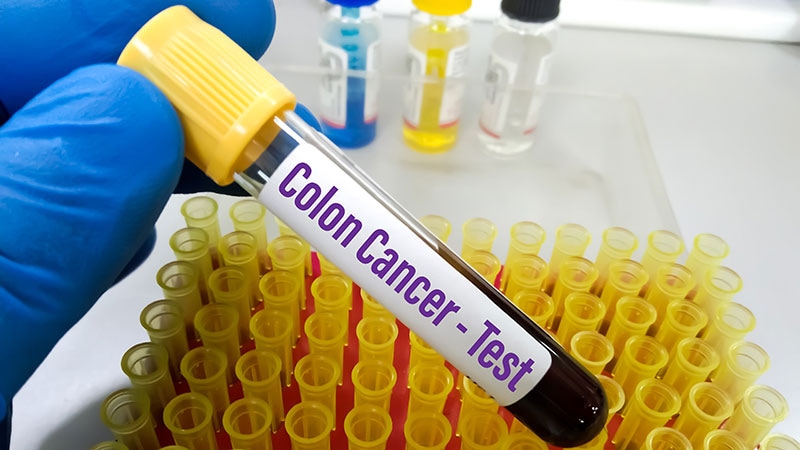An investigational blood test for early detection of colorectal cancer (CRC) in average-risk adults met the primary endpoints of sensitivity and specificity in the PREEMPT CRC study, the largest study of any blood-based CRC screening test.
With continued optimization, this blood test “may provide a convenient, effective option for colorectal cancer screening in the intended use population,” said Aasma Shaukat, MD, MPH, with NYU Grossman School of Medicine in New York.
CRC screening rates remain suboptimal, with nearly 40% of eligible adults in the United States not up to date with screening, noted Shaukat, who presented the study results at the American Society of Clinical Oncology (ASCO) Gastrointestinal Cancers Symposium 2025 underway in San Francisco.
Blood-based testing offers a promising complementary approach that may boost patient adherence among unscreened individuals, she added.
The study evaluated the clinical performance of the investigational blood-based screening test in 27,010 adults aged ≥ 45 years at average-risk for CRC. Patients with no personal history of cancer, colorectal adenoma, or inflammatory bowel disease, as well as no family history of CRC or hereditary gastrointestinal cancer syndromes were eligible for the study.
Participants had blood drawn before bowel preparation for colonoscopy, and the blood test results were measured against colonoscopy findings.
The primary endpoints included sensitivity for CRC, specificity for advanced colorectal neoplasia, and negative and positive predictive value for advanced colorectal neoplasia. A secondary endpoint was sensitivity for advanced precancerous lesions.
The blood-based screening test met all primary endpoints, with a sensitivity for CRC of 79.2% and a specificity for advanced colorectal neoplasia of 91.5%, Shaukat reported at a conference briefing. Negative predictive value for advanced colorectal neoplasia was 90.8%, though the positive predictive value was only 15.5% and sensitivity for advanced precancerous lesions, a secondary endpoint, was 12.5%.
Similar results were achieved in a prespecified analysis in which performance of the blood test was weighted to match US census data for sex and age distributions. Sensitivity for CRC was 81.1%, specificity was 90.4%, and negative predictive value for advanced colorectal neoplasia was 90.5%; but the positive predictive value was 15.5%, and the sensitivity for advanced precancerous lesions was 13.7%.
This type of analysis provides “a snapshot of how [the test] would perform in the US population,” Shaukat explained.
She noted that the sensitivity for CRC and advanced precursor lesions was “lower than expected and will continue to be optimized in future research and development.”
It will also be important to determine when the test should be repeated and how often and to look at the determinants around cost and comparative effectiveness, she said.
Perhaps modeling and other outcome studies — which will be forthcoming in the future years — will help shed some light on these questions, she added.
Briefing moderator Julie Gralow, MD, ASCO chief medical officer, said it will be important to compare how this new blood test compares with Guardant Health’s Shield CRC blood test that was approved in 2024. Although there’s no study directly comparing the new blood test to Shield, data from the ECLIPSE study reported that Shield had 83% sensitivity for CRC and 90% specificity for advanced neoplasia, but only 13% sensitivity for advanced precancerous lesions — which appears similar, so far, to findings reported for the new blood test.
But any screening is better than no screening, and with further study, this blood test may “add another tool to our toolkit,” said Pamela Kunz, MD, director of the Center for Gastrointestinal Cancers at Smilow Cancer Hospital and Yale Cancer Center, New Haven, Connecticut, who spoke at the briefing. Kunz said she is eager to see some of the future work optimizing the sensitivity and subsequent analyses that look at differences by race and ethnicity.
The study had no specific funding. Shaukat consults for Freenome Holdings, Inc., and Iterative Health. Kunz declared ties with Ipsen, Novartis, Genentech/Roche, Amgen, Crinetics Pharmaceuticals, Natera, HUTCHMED, and ITM Isotope Technologies Munich SE. Gralow declared consulting or advisory roles with Genentech/Roche.
Source link : https://www.medscape.com/viewarticle/promising-new-blood-test-colorectal-cancer-screening-2025a10001rf?src=rss
Author :
Publish date : 2025-01-24 05:32:31
Copyright for syndicated content belongs to the linked Source.
